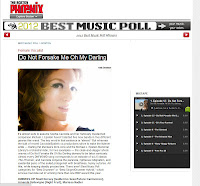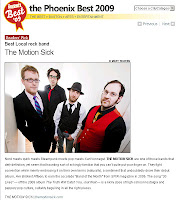 |
| Sophia Cacciola 2012 Best Female Vocalist |
Today, the Boston Phoenix announced that it would be shutting down, effective essentially immediately (Official statement by publisher Stephen M. Mindich). There are countless reasons that this is devastating news, but let me give a few points that I don’t think have been sufficiently covered in the many, many articles on the shuttering of the Phoenix. (After a day of wallowing on Facebook about it, I ended up being quoted a little: International Business Times, UNregular Radio.)
At the 2011 National Conference for Media Reform, I was part of a panel Local Media and Culture: What Does It All Mean for the Music Scene? (http://conference.freepress.net/session/505/local-media-and-culture-what-does-it-all-mean-music-scene) (The panel also included Phoenix writer Chris Faraone.) I prepared a summary of my discussion points and eventually, a full video of the panel was released.
 |
| The Motion Sick 2009 Best Local Rock Band |
I posited that the success of an arts scene is extremely dependent on outlets that celebrate, legitimize, and promote artists and events. In my view, the idealistic perception that great art without context will still rise up is just simply false (anecdotal example). Artists need people to talk about them. Artists need the media to convince people to talk about them. The Phoenix was one of the most prolific “talkers” in town. We personally benefited from their coverage numerous times including a 2009 Best Local Rock Band Poll win for The Motion Sick and 2012 Best Female Vocalist Win for Sophia Cacciola. Does that mean The Motion Sick were the best band in Boston in 2009? I certainly wouldn’t say so. But that doesn’t matter. That piece of recognition meant that countless people took us more seriously. We “earned” some legitimacy. Our friends who never would dare attend a local rock show figured, hmmm, if the Phoenix says they are the best, I had better go see them! Some of those people even kept coming back.
The fact is, the quality of local music and art is high. It simply is. I’ve always said the only reason that Boston doesn’t explode in the world music scene is that we have none of the infrastructure necessary – no labels, no large management companies, no substantial national booking agencies. Think of any smaller scene that exploded in some form – Seattle, Athens, Omaha, etc. What did they have in common? A prominent label that championed the work done in the city. It’s not that there was magically a higher concentration of quality work in any of those cities.
So why was the Phoenix (or really an alt-weekly in general) important to the health of an arts community?
A summary of my points from the panel:
1. Media, whether corporate or independent, carries a psychological impact. Even in its “least objectively authoritative” form, If I create a blog with a name (other than my own name), and write about anything I want, there is a perception of authority.
2. People (in the wide public sense) seek approval externally and have a hard time making up their minds independently about art and music. If this were not true, I don’t think criticism would have developed. When I’ve gotten press coverage for shows, it’s not so much that random people read about the band and show up, but rather that people I know already gain the impression that because what I am doing is important enough to get that coverage, it’s more worthy of their time and energy.
3. Part of that authority arises from the perception that media serves as independent, unbiased commentary.
4. In an ideal world, great media will grow and develop coverage as bands grow and develop. There will be opportunities for new bands, veteran bands, and for contextualizing all bands within the history (and future) of the region. The media will tell a continuing story rather than just giving a glimpse. (Media creates the historical record.)
5. As the arts grow, so do the sources of information on the arts. There is a symbiotic relationship between music and music journalism. In a sense, one could argue that not only do “scenes” develop further as a result of media coverage, but also that media success develops around “scenes.”
In short, the artists lose. In fact, with the loss of such a significant voice legitimizing us, I would argue that the artists lose more than anyone else.
Let me also say that The Phoenix had some of my absolute favorite writing in town. The weekly housed the work of a huge number of exception writers, making really important contributions to local arts, culture, and politics. Lots of great contributors, past and present, but just a few that really have done writing work that has struck me in recent times:
Michael Marotta has consistently proven himself to be one of my favorite Boston music writers. He is unapologetically opinionated, unafraid, and insightful. He says what has to be said. He says what is often hard to say. He worked to unite the paper and the WFNX radio local coverage, often doing crossover features between the two, which was an extremely unique advantage provided by the remarkably close operations of the radio station and the print publication.
Chris Faraone is one of my favorite journalists ever. He would spend long periods doing extensive in-the-field research to cover sociopolitical issues that no one here in town would touch with a ten-foot pole. I got excited every time I saw the publication of one of his longform political pieces. I even learned a whole lot about local hip-hop. In fact, the only things I know about local hip-hop come from reading Faraone’s articles.
David Thorpe and Pitbull. I shall say no more.
[…] in Boston much more articulately than I can muster here. I highly recommend reading it. (In fact, read his piece on the shuttering of the Boston Phoenix, […]
[…] must invent the narrative that places value on the work. The death of local venues and local media https://blog.mikeandsophia.com/2013/03/httpwww-mikeandsophia-com201303the-loss-of-boston-phoenix-is-terrible-html/ ) has been devastating in Boston over the past few years. This seriously perpetuates the cycles […]